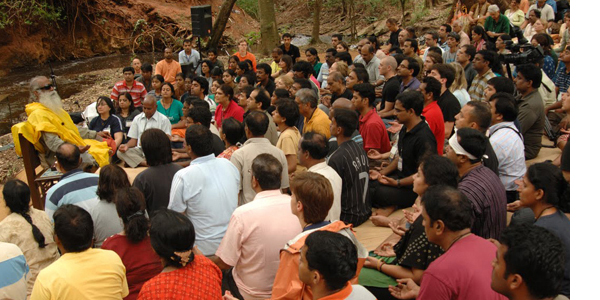Epics – A Lively Form of History

“If you pay enough attention, every day there is magic all over the place. Mud has become a flower. The filth has become fragrance. Is this not magic? It is happening every day, everywhere.”
—Sadhguru
Kavitha: Sadhguru ji, I have watched many of your interviews, did a little bit of homework before I came here, but anyway I will definitely start from a basic question, which not only me but many people would probably want to understand. When you say you are a mystic, can you also do some magic?
Sadhguru: The greatest problem that humanity is facing and suffering is that they are so absolutely involved and enamored and overwhelmed with their own psychological drama that they are completely missing the magic of creation that is happening everywhere. The psychological drama, your own thought and emotion has become so big, and the physiological drama, your own body, takes a certain amount of space. Because of this drama, the entire existence has gone somewhere else. If you pay enough attention, every day there is magic all over the place. Mud has become a flower. The filth has become fragrance. Is this not magic? It is happening every day, everywhere.
But most people’s idea of magic is that I should pull out a pigeon from my pocket right now. If I do this, you will have a bird, and I will have a shitty pocket! That is all that happens.
Kavitha: Well, I was really hoping that you could do something so wonderful and magical that all the men in this world would forever be changed about their perspective towards women.
Sadhguru: This is why the government has funded the ISRO project to Mars, so that we can live on two separate planets! Yes, unfortunately, there have been long periods of exploitation of women across the world and even in this country. But there was a time when, in this country, women were not exploited by any means. They lived fabulous lives. You just look back and see. For example, we do not have a full picture, but in whatever remnants we have of stories like Ramayana or Mahabharat, do you see women going around in veils? Do you see women hiding? No. The queen sat with the king in public.
However, you must understand, we have faced a little over a thousand years of invasions. When invasions happen, they not only go for your gold, they also go for your wives and your daughters. So, hiding them somewhere, in granaries, among sacks of grain, became a normal thing. When a thousand years of continuous invasions happened, the risk of keeping a woman out became a very wrong thing to do. Unfortunately, that is still continuing.
I think we will break through in the coming generation. I think we already are in a big way. We are only the second generation after Independence. Do not be in too much of a rush and make this one species into two. Homo sapiens is a single species. Unfortunately, in reaction to the past exploitation, we are trying to create two species. This is not going to work well, either for men or for women in the future. It is very important that the changes we make in our society are not in reaction to the wrong things that have happened in the past. What is the right thing we want in future? We must focus on that consciously, rather than simply reacting.
Kavitha: So, what Sadhguru ji is basically saying is there is no magic. It is only logic to work towards…
Sadhguru: No, no, no, there is magic also. The logic that we are employing is very rudimentary. This is the significance of this culture, where we took logic to a point where it became an access to the mystical and the magical. We have not seen it as logic versus magic. We saw that a stable, logical foundation is a must for continued, sustained magic to happen in our life. Otherwise, your magic will just be a flash in the pan. It will not continue. If your logic is well established and you take it to a certain height, then you can make your life magical every moment. For this to happen, you should not think with the fundamental logic about who is a man, who is a woman. Both of us are here because a man and woman came together. Or do you still believe in the magic that somebody dropped you from heaven?
First of all, grading everything by economic standards is a serious mistake. If “How much can you earn? How much can you provide?” is the only standard of wellbeing, then believe me, you may have women in the world, but you will kill the feminine totally. Today, if a woman wants to be successful in the world, she needs to act like a man. This is slavery of the worst kind. It is very important we have feminine in equal proportions as masculine to make this world and our lives beautiful.
Our idea of success has become so rudimentary – “How much money have you got?” If you do this, you will kill the feminine totally because this is a gross world. You will bring marketplace into your mind and into your home. This is happening in the Western societies. When they are getting married itself, they are making a contract – “When we get divorced, who gets what?” How much ugliness do you want in your life? How can two people be woven into one if you are making calculations like this? So, do not take the marketplace home. This is what will happen if you make your standard of life purely economic.
Kavitha: Agreed. Since you have mentioned Mahabharat, Ramayan and all these scriptures…
Sadhguru: If I can correct that – we should not misunderstand what is a scripture and what is a very organic way of writing our history. An epic is a historical document written in a lively form so that it is relevant to you all the time. Right now, the Western way of writing history is like this, “This king came. He killed so many people. He did this. He did that. He died. And next one came. He did this. He did that. He died.” What are you going to do with this? If a thousand years ago, somebody lived or died, what does it matter to you? But, when you read Ramayan or Mahabharat, these are live stories, so that you can relate to them even today. This is genuinely learning from the past. The basis of being human is that we can learn from someone else’s experience. All the nonsense need not happen to us. Maybe it happened 5000 years ago, but we can still correct our lives by looking at what happened to them.
Kavitha: When you have been learning from the Ramayan and Mahabharat and many more stories for generations, how do we expect the current Indian men to not treat his wife like Sita? You know, he can simply leave her in the forest because somebody says something. How do you unlearn these things that we have learned all our life? How do you hit the refresh button and start all over again by looking at a woman as a respectable figure? How do we teach this to our children?
Sadhguru: Let me put it in the right perspective. Rama walked all the way south, fought a battle, burned down a city to get back his wife. That is not a small thing.
Kavitha: But, then he again gave her an agni-pariksha. He did not trust his wife.
Sadhguru: We are taking these words literally. Agni-pariksha did not mean somebody has to enter the fire. It meant she was put through some tests – of course, because he was the king. Everybody is looking at him as an idol. How you behave and what you do is very important because the entire nation’s life depends on you. So, Rama was setting an example in those days. Sita was pregnant, his sons were inside. For a king, his sons are important. In spite of that, he sends her to the jungle because otherwise, there would be disruption in the country. Are you seeing this as a negative thing? I think we need such prime ministers and leaders in this country, that no matter what, for the wellbeing of the nation, they will do what is needed.
Kavitha: Agreed, a leader has to sacrifice, no doubt. We will go to any length to sacrifice and send a message to the people. But this particular message is taken so literally by other people that they treat their wives like that. How relevant is it to take an example from the leader he is and follow that, even adapt it to the modern times?
Sadhguru: Today, if we send you to a forest, that is called a safari holiday. I think this is being taken very literally. When I was in Nellore, I was speaking to a large group of over 7000 school students. One fourteen-year-old girl stands up and asks, “Sadhguru, they are saying that Rama walked all the way from Ayodhya to Sri Lanka. Is it practical or is it just a story?” Then I asked the same question, “You are a young girl right now. You will grow up and find a man. Do you want that kind of a man who, if you get lost, no matter what, he will follow you and find you, or do you want a man who will find local solutions for himself because it is not practical?” Even this little girl knows what kind of man she wants.
To misunderstand any event, you are always free, but to understand it is your business, isn’t it? And making judgments today on life that happened 5000-6000 years ago, from our standards here, is completely off.
Kavitha: Yes, that is the problem. So we do not have to literally take the message from all these epics, but move on.
Sadhguru: That is why I corrected that. It is not a scripture. It is only a historical document. It is for us to learn, not for us to misinterpret.
Editor’s Note: Mahabharat – Saga Non-pareil is an exploration of the phenomenal epic through the eyes of a mystic. Download now!
A version of this article was originally published in Isha Forest Flower January 2018.


